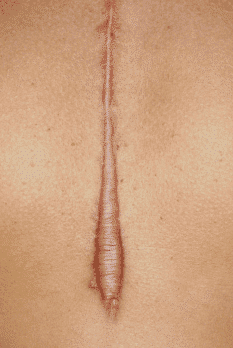Ask Dr. Jones

Painful, itchy and unsightly raised scars, also known as keloids afflict more than 18 million people around the world. African Americans, Asians, and Hispanics are actually genetically prone to developing these skin lesions. Keloids not only scar the skin but can also scar a person’s self-confidence. These non-malignant tumors will form at the site of skin trauma like cuts, burns or bruises.
Radiation exposure can cause biological changes in the cells inside the human body. Radiation of certain wavelengths or ionizing radiation has enough energy to damage DNA and can cause cancer, depending on the amount of radiation used and the area being treated. When treating thick, overgrown scar tissue like keloids, a different type of radiation known as Superficial Radiation Therapy is used. This type of radiation is safe and only penetrates the skin deep.
Superficial Radiation Therapy is actually used to treat certain types of skin cancer. A precise and calibrated dosage of Superficial Radiation Therapy penetrates about 5 millimeters below the skin’s surface in a fast and effective way. Unlike other powerful radiation treatments, Superficial Radiation Therapy can carefully destroy malignant skin cancer cells, while preserving healthy tissue. Superficial Radiation Therapy is one of the safest and most effective alternative skin cancer treatments available.
Keloid removal used to involve multiple invasive surgeries, resulting in the keloid growing back bigger and more painful at the new incision sites. With the surgery method, these non-malignant tumors or skin lesions reoccur up to 90% of the time with patients. Superficial Radiation Therapy decreases the recurrence rate to as low as 10%, and in many cases 0%.
When Superficial Radiation Therapy is administered, the skin cells that form into keloids are destroyed. This keeps the skin smooth and flat as the incision heals. The U.S Food and Drug Administration has approved Superficial Radiation Therapy to treat keloids caused by surgery, injury or other factors. This non-invasive alternative to surgical treatments is very low dosage in radiation and should not cause cancer for patients.



